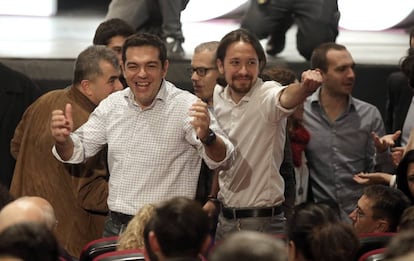For Spain’s Podemos, not much to celebrate over Macron’s win in France
Anti-austerity party was lukewarm in calling for vote against hard-right Marine Le Pen

Spain’s leftist party Podemos breathed a sigh of relief on Sunday when it emerged that the far-right candidate Marine Le Pen had failed to win the French presidential election. But it wasn’t just because of their opposing political views. It was also because a victory by the National Front leader would have earned Podemos criticism over its lack of public support for the centrist Emmanuel Macron.

The party led by Pablo Iglesias had asked French citizens to go out and vote against Le Pen, but it stopped short of asking them to vote for Macron. This decision was reached after Podemos’ sister movement in France, La France Insoumise (Unbowed France), decided to ask its supporters for an abstention or a blank vote.
Podemos’s backing of Jean-Luc Mélenchon, the leader of La France Insoumise who failed to make it to the presidential runoff, has placed the Spanish leftists in an uncomfortable situation. It also adds to the negative fallout from Podemos’ public association with Syriza in Greece and with its ties to Venezuela, whose increasingly authoritarian, leftist regime Podemos has failed to condemn.
Podemos has tried to push the subject of Europe away from the center of the debate, instead prioritizing the domestic agenda
Héctor Sánchez, CIDOB
As a result, the party is now trying to focus less on foreign policy affairs, which are something of a problem for its leaders.
Podemos’s critique of both French candidates has been so even that party leaders were actually forced to remind the public that “Podemos is a clearly anti-fascist party,” says Podemos MEP Miguel Urbán.
“We are not treating them equally, we are saying that one thing makes the other possible,” says Urbán. “That neoliberal policies are the gasoline that fuels the political success of the extreme right. We are going to fight both liberalism and fascism.”

If the French presidential election has been somewhat vexing for Podemos, the Greek case is the best example of how one of the Spanish leftists’ main international alliances has ended up hindering its own domestic policies. After celebrating Syriza’s victory in January 2015 – Pablo Iglesias attended Alexis Tsipras’s campaign ending – and underscoring the “close political relationship” between both anti-austerity parties, Podemos now rejects comparisons with Greece, where the anti-austerity government has since had to accept serious spending cuts in order to receive funds from international lenders.
That was a huge blow for Podemos, “because no European government has been so close to putting up an alternative within the EU, but in the end it couldn’t,” says Héctor Sánchez, a researcher at the Barcelona Center for International Affairs (CIDOB). As a result, “Podemos has tried to push the subject of Europe away from the center of the debate, instead prioritizing the domestic agenda.”
For all that, Podemos’s truly weak point in its foreign policy agenda is Venezuela, whose government it refuses to criticize despite the anti-democratic turn the country has taken. In fact, Podemos has never condemned the existence of political prisoners in Venezuela. Asked point-blank if there are any, MEP Urbán answers with “it depends.”
Adding to Podemos’s similarities with other populist movements, whether left-wing or right-wing, is the fact that it opposes trade agreements such as the Transatlantic Trade and Investment Partnership (TTIP).
“It is moderately critical of the EU without being a euroskeptic; it is moderately opposed to globalization without sliding into protectionism; and it maintains a non-committal attitude towards the conflict in Ukraine without being openly pro-Russian,” notes Ignacio Molina, chief researcher at the think tank Real Instituto Elcano. There is, of course, one major difference with right-wing populism: “Podemos has vastly different views on immigration issues and multiculturalism.”
Another difference is its stated enemy. While right-wing populism points at foreigners as “the enemy of the people,” and left-wing populism blames German Chancellor Angela Merkel or international lenders, to Podemos the enemy lies within: it is the political and economic “caste,” lately redefined as “la trama” or the plot.
English version by Susana Urra.
Tu suscripción se está usando en otro dispositivo
¿Quieres añadir otro usuario a tu suscripción?
Si continúas leyendo en este dispositivo, no se podrá leer en el otro.
FlechaTu suscripción se está usando en otro dispositivo y solo puedes acceder a EL PAÍS desde un dispositivo a la vez.
Si quieres compartir tu cuenta, cambia tu suscripción a la modalidad Premium, así podrás añadir otro usuario. Cada uno accederá con su propia cuenta de email, lo que os permitirá personalizar vuestra experiencia en EL PAÍS.
¿Tienes una suscripción de empresa? Accede aquí para contratar más cuentas.
En el caso de no saber quién está usando tu cuenta, te recomendamos cambiar tu contraseña aquí.
Si decides continuar compartiendo tu cuenta, este mensaje se mostrará en tu dispositivo y en el de la otra persona que está usando tu cuenta de forma indefinida, afectando a tu experiencia de lectura. Puedes consultar aquí los términos y condiciones de la suscripción digital.








































